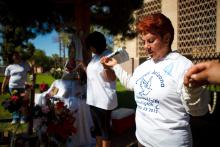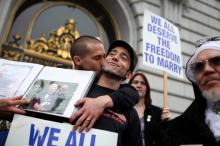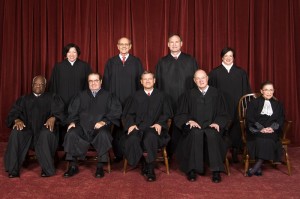Supreme Court
WASHINGTON --- An appeal over Christmas sweets turned bitter on Monday (June 11) when the U.S. Supreme Court declined to hear the so-called “Christian candy cane” case.
The case out of Texas has become a rallying point for conservative Christians concerned about free religious expression in public schools and students' ability to distribute religious literature.
The case, Morgan v. Swanson, kicked off nine years ago in the Plano Independent School District as principals prevented self-described evangelical students from distributing religious literature on school grounds.
IF THE FIRST decade of the 21st century began with the Supreme Court’s Bush vs. Gore ruling that selected a U.S. president, it ended with another decision that was also conspicuous as a departure from long democratic precedent. And like Bush vs. Gore, it was a case of judicial activism tilting the electoral system toward conservative interests and outcomes.
The Court’s 5 to 4 decision in Citizens United vs. Federal Election Commission on Jan. 21, 2010, allowed the use of corporate and union money in unlimited sums to influence election campaigns. Citizens United was, all at once, a truly remarkable piece of judicial activism, a precedent-shattering evisceration of a century-long tradition of limiting corporate power in American politics, a break with the republican tradition’s well-founded fear of political corruption, and a direct interference with the electoral rules in a way that favored those who had put the conservative justices in a position to make the ruling in the first place.
The case arose when Citizens United, a conservative group, brought suit arguing that it should be exempt from the restrictions of the 2002 McCain-Feingold campaign finance law for a movie it made that was sharply critical of Hillary Clinton, at the time a presidential candidate. The organization argued that, as a First Amendment matter, it should not be required by law to disclose who financed the film.
The conservative majority’s determination to go far beyond the specifics of the case it was considering became clear in June 2009 when the Court, in a remarkable act of overreach, postponed a decision and called for new briefs and a highly unusual new hearing. It chose to consider an issue only tangentially raised in the original case by calling into question a 1990 decision that upheld the long-standing ban on the use of corporate money in campaigns. As Justice John Paul Stevens noted later in his scalding dissent, “Essentially, five justices were unhappy with the limited nature of the case before us, so they changed the case to give themselves an opportunity to change the law.”
From Newsweek Magazine:
It’s worrying to think that shareholder democracy is needed to rectify shortcomings in the real thing, yet this week two of the nation’s biggest corporations will give their investors precisely that opportunity. Motions on the ballots at the annual meetings of Bank of America and 3M will act as referenda on the U.S. Supreme Court’s decision in the Citizens United case, which handed companies the same freedoms of speech accorded people. Happily, restricting the use of corporate money in politics isn’t just good for democracy, it’s good business.

I participated the Jericho March for people of faith, organized by the New Sanctuary Movement of New York. We walked the half mile loop around the Supreme Court in silence, praying for a society that builds up justice and dignity. The tough part about this morning was dealing with “the others.”
The future of Arizona’s immigration law, and by extension the laws in a number of other states modeled on it, was argued before the Supreme Court this morning. While it’s always dangerous to read too much into the questioning during the oral argument, early news reports indicate that the justices were sympathetic to the provision allowing police officers to check the immigration status of people who are arrested or otherwise detained.
According to the Associated Press:
"Liberal and conservative justices reacted skeptically to the Obama administration's argument that the state exceeded its authority when it made the records check, and another provision allowing suspected illegal immigrants to be arrested without a warrant, part of the Arizona law aimed at driving illegal immigrants elsewhere."
The Court’s decision is expected in June, and could become an important issue in the presidential election campaign.

Today, the Supreme Court is hearing a case about the constitutionality of Arizona’s anti-immigrant legislation, SB 1070. It will be months before the case is decided but a broad spectrum of the Christian community already has their minds made up.
This legislation is not just ethically bankrupt but undermines basic Christian values and American ideals. The court will decide whether it is legal, but it is already clear it isn’t moral.
We are both evangelical Christians. One of us is white and one of us Hispanic. It is our common faith commitment, not the color of our skin, that unite us on the need for comprehensive immigration reform and in opposition to patchwork punitive legislation like we have seen in states like Arizona and Alabama.

Maybe the Affordable Care Act is constitutional and maybe it's not. If it turns out to be constitutional, maybe it's good legislation and maybe it's not. In any case, it's looking increasingly likely that the Supreme Court, come June, will strike down at least the requirement that everyone buy health insurance. And if the mandate goes, two other requirements will most likely go with it: Once again insurers will be able to reject or refuse to renew applicants. And once again Americans with pre-existing conditions will be uninsurable.
Let me tell you four short stories about friends of mine. These are true stories, not hypothetical examples. I have changed nothing but the names of the people involved. I am not arguing on behalf of the constitutionality of the Affordable Care Act. I'm just saying that all of these people had serious problems before it was passed, and some of them are doing much better now because of it.
People lined the steps of the Supreme Court once again today, asking for their voices to be heard on the ongoing healthcare debate. Justices on Monday began their three-day review of President Barack Obama's 2010 Affordable Care Act, which would require U.S. citizens to purchase health insurance or face a penalty.
Thousands gathered starting on Friday for a ticket inside for oral arguments and to stand outside the court in protest, both for and against the plan.

It has been a busy few weeks at the U.S. Supreme Court. Hundreds of people having been in line over the weekend to obtain one of the coveted public tickets for the healthcare mandate case. And last week, in a case which was somewhat less publicized, the highest court in the land debated whether juveniles should receive life without parole in homicide cases, the only crime for which such a punishment is still an option for minors.
A daunting task, but one that garnered a number of thoughtful pieces throughout the media and blogosphere.

But what about when the government itself asks us to lie, or at least to not fully disclose the truth? Consider the “Don’t Ask, Don’t Tell” policy, which the military had in place for many years. What if a soldier argued that not knowing the person serving next to them was actually gay caused them irreparable psychological or emotional harm? Not that I think such a case holds any water, but I’m using this to make a point; once you allow the government to have legal authority over personal speech, it’s a difficult box to close back up once it’s open.
I think it’s a particularly compelling question given the debates about placing the Ten Commandments in public buildings. Yes, there are many parallels between those biblical laws and the laws enforced by the government. However, they are not the same in all cases. And the distinction is important not only with regard to the separation of the powers of church and state, but also in maintaining the sovereignty of the individual in the face of a powerful government.

In a decision that likely will set the stage for a high-stakes showdown at the U.S. Supreme Court, the 9th U.S. Circuit Court of Appeals struck down California's Proposition 8 ballot measure that banned gay marriage, saying there is no "legitimate" reason to keep same-sex couples from marrying.
The U.S. Supreme Court is set to begin hearing oral arguments this week in one of the most important church-state cases in decades. In Hosanna-Tabor Church v. Equal Employment Opportunity Commission, the court will consider whether a Lutheran school in Michigan is subject to a federal law banning discrimination based on a disability.

In his column last week, Sojourners chief Jim Wallis talked about his frustration with the perennial misuse of the word "evangelical" by various media to describe folks and ideas that, in his view, and that of many of us who self-describe as evangelicals, don't bear any resemblance to what we understand that term to actually mean.
Below is a compilation of recent media reports where the word "evangelical" is invoked. When you read these, evangelical brothers and sisters, do you recognize yourself in how the word is used and defined? Or does it ring false to you and your understanding of what "evangelical" really and truly means?
So what makes the Troy Davis case stand out from most other death penalty cases?
Serious doubt.
Not about whether the death penalty is the appropriate punishment for Davis or has been correctly applied.
The doubt raised in Davis' case is whether he committed the crime at all. And those questions about his guilt have prompted hundreds of thousands of people to raise their voices in opposition to his execution, most recently former FBI Director William Sessions who, in an op-ed in the Atlanta Journal-Constitution Friday, called on the Georgia Board of Pardons and Paroles to commute Davis' sentence to life in prison.
 An account in The New York Times by Ethan Bronner reports that Israeli women and West Bank Palestinian women and girls have once again broken Israeli laws. They have gone swimming in the Mediterranean Sea.
An account in The New York Times by Ethan Bronner reports that Israeli women and West Bank Palestinian women and girls have once again broken Israeli laws. They have gone swimming in the Mediterranean Sea.
More than two dozen Israeli women invited Palestinian women and girls from the southern part of the West Bank of the Jordan River -- who are not normally allowed into Israel and have no access to the sea -- to go swimming with them. Under Israeli military occupation since 1967, according to Bronner, "most had never seen the sea before."

